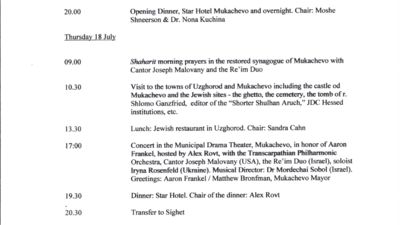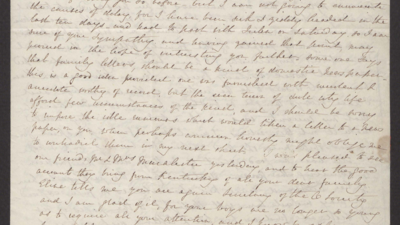Oral History Interview with Lola Krause
Title
Date
Contributor
Summary
Lola Krause, née Miestschanimoff, was born March 1,1916, in Vitebsk, Belarus. Her father, a successful movie photographer, and her mother, an accomplished pianist from Latvia, were non-observant Soviet Jews. Lola studied music with her mother, learned German from her governess and attended public school in Vitebsk. Rejected by the local Soviet college because of her father’s upper-class status, she moved to Leningrad, studied engineering and worked in film and scientific instrument factories. She married in 1938 and a son was born in 1939.
She details the siege of Leningrad; German bombardment; disease; lack of food and all public services. Her husband died of starvation, her weight dropped to 60 pounds and at three years of age, her son weighed only seven-and-a-half pounds. When her factory was relocated to Samarkand in 1941, she traveled with her son in a cattle car for six weeks, stopping in Tashkent. There she met her uncle, a doctor, who insisted that the fragile child remain with him in the hospital. A year-and-a-half later, he joined her in Samarkand, where she worked until 1946. She married again and the family moved illicitly across European borders, living in Jewish Agency camps in Wroclaw (Breslau), Poland and at Waseralfinger, near Stuttgart, Germany. Another son was born and they survived with food packages from American relatives.
In 1949, Lola and her familyemigrated to the United States. Lola describes their adjustment in Bradley Beach, N.J. and in Philadelphia, working in factories and establishing their own cleaning business. She sold her valuable bracelet to buy a piano, suffering ridicule from poor neighbors, because she believed children had to learn to play an instrument. She had her sons circumcised, sent them to Hebrew school and began to observe Jewish holidays. A visit to Israel in 1972 further heightened her Jewish consciousness.
More Sources Like This
of
Debora Neudorfer
Debora Neudorfer, nee Flachs, was born in Bucharest, Romania, December 31, 1914 to a middle class family. Her father was a business man in industrial chemicals. Debora briefly describes pre-war Bucharest, Christian-Jewish relations and her education at a Protestant Girls’ Schoolwhich was comprised of nearly 99% Jewish girls. Her father’s business was diminished due to the war and Debora and her sister sold items they knitted at home. Debora describes that all Jews in Bucharest with a certain amount of education were forced to complete one year of labor. Debora walked to a private house to complete her assignment ofoffice work while she lived at home.
Debora describes their life under the rule of Antonescu and how it did not change very much and gives details about some family members and their experiences with forced labor. She also explains how people thought things would improve under Russian rule, but states that it got worse. She alludes to Russian soldiers’ rape of women when they came in in August of 1944.
In October 1944 Debora fled to Palestine with her future husband whom she had met a few months earlier. He was a Polish Jew who had escaped a labor camp and had false papers. When they met, they were unable to get married so they fled with a group of Polish and Romanian young people. A Jewish organization sent them across the Black Sea by boat on which she and her husband were married.A train took them through Turkey to the Atlit detention camp in Palestine, where British officers interrogated all refugees regarding their wartime experience. They lived in Palestine for about two and a half years until they went back to Poland to search for her husband’s family. Her husband’s brother was the only sibling of six who survived the war. They returned to Israel in 1950 and emigrated to the United States in 1957. Her mother, father, sister, and brother-in-law, and several cousins and extended family membersall survived the war.
of
Elizabeth Bleiman
Elizabeth Bleiman, née Zuckerman, was born July 10, 1921 into a modern Orthodox family in Ófehértó, Hungary and completed elementary school there. She attended Jewish high school in Debrecen until 1937 and returned home, where all of her family suffered from antisemitic government restrictions. After German occupation in March 1944, they were deported to the Kisvarda Ghetto. She details their transport to Auschwitz in July 1944, her separation from her parents during selection by Dr. Mengele, and the harsh conditions in thecamp, starvation rations and being advised by an elderly German prisoner to try to escape via transport. She describes how she and a friend got into a transport and were moved to Stutthof, the terribly crowded conditions and prisoners getting burned from standing in the sun all day during Appells. She again escaped via transport with a friend, this time to Praust, where they were forced to install cables for a new airport. She describes that French prisoners would write them uplifting notes indicating that the Russians were advancing and to hold on to life. She details cruel conditions of a forced march to Danzig.
Liberated by Russians in February 1945, she was hospitalized for two months with typhus. After recovery, she and a friend foraged for food, shelter and clothing in abandoned houses as they traveled from Danzig to Hungary. In Ófehértóshe found her family home was occupied by non-Jewish refugees but she recovered some gold and other valuablesburied by her father before his deportation. In 1946 she moved to Germany to live in an American displaced persons camp, where she married a Lithuanian Jew in 1947 and they emigrated to the United States in 1949. Elizabeth refers to continuing antisemitism in Hungary despite a new liberal constitution.

This document is the program for the Limmud FSU Global Leadership Summit, held in Sighet, Romania, from July 19-21, 2013, with initial activities in Mukachevo and Uzhgorod, Ukraine, starting July 17. The summit featured Nobel Laureate Prof. Elie Wiesel and a comprehensive schedule including morning prayers, visits to significant Jewish historical sites (such as the Jewish ghetto, cemetery, and Wiesel Museum), concerts, and various panel discussions. Key themes addressed in the panels included the Holocaust, the contemporary meaning of Judaism, the transition from "Jews of Silence to Jews of Hope," Prof. Wiesel's life journey, "The Jews of Romania and the Land of Israel," and "Zionism and Anti-Semitism." Notable participants and speakers included Dr. Julius Berman, Prof. Aaron Ciechanover, Knesset Speaker Yuli Edelstein, Prof. Alan Dershowitz, Prof. Deborah Lipstadt, along with a range of cantors, rabbis, and community leaders. The program also highlighted messages from Presidents Barak Obama and Shimon Peres.
of
Lili Altschuler
Lili Altschuler was born September 30, 1928 in Lodz, Poland to a well-to-do, non-observant Jewish family. Before the war she was educated in a private Jewish school. Lili describes the change in atmosphere in 1937-38, the prohibition against kosher slaughter and the Polish Jewish citizens being expelled from Germany and forced to return to Poland (‘38).
In 1939, just before the Lodz Ghetto was formed, Lili and her parents fled to relatives in a suburb of Kielce, called Opatow. She describes the hardships and restrictions that ensued and describes and encounter with Volksdeutsche in which she was injured. Her father, fearing the reality of the deathcamps, bought their way into the slave labor camp Skarazysko Kamienna, run by HASAG. They worked in a munitions factory. She describes the scant daily rations, the lack of medical treatment, and the cruelty of Ukrainian guards and also Jewish Kapos’ cruel behavior. She also describes some resistance in the camps: the formation of small singing and reading groups.
In the summer of 1944, she and her parents were deported to a munitions factory in Czestochowa. She describes slightly better conditions there. On January 16, 1945 the Germans attempted to deport everyone to a location farther away from the Soviets. After the men were sent off in trains, the Germans fled, leaving the women on the train platform. They were liberated by the Soviets that night. She and her mother stayed for a time in Czestochowa, then returned to Opatow, then Lodz to look for surviving family members.
Her grandparents perished in the Lodz Ghetto. Her father was sent to Buchenwald and later liberated by the Americans in May 1945. They were reunited in Lodz and later went to Stuttgart, Germany through Czechoslovakia with the help of the Zionist group, Brihah1 and UNRRA. They came to the United States via a displaced persons camp in Stuttgart in 1948.
of
Bernard S. Mednicki
Bernard S. Mednicki was born in 1910 in Brussels, Belgium, the youngest of four children in an orthodox Russian Jewish family from Kishinev. His father served in the Russian army until the 1903 pogrom, when he deserted and moved his family to the West. Bernard attended a cheder and public school in Brussels, where he experienced some antisemitism. He was apprenticed to an orthopedic technician, became a Belgian citizen in 1928 and was married in 1931. In 1933, he became active in the anti-fascist Socialist Party and anti-fascist resistance. He describes the German invasion on May 12, 1940.
Assuming Christian identities, his wife and children fled to Paris and he travelled through southern France until they were reunited in Riom. He details extensively the travails of fellow refugees, his work with the French resistance during 1941-1942 in Clermont-Ferrand, and sabotage activity with the Maquis in the mountains near Volvic. He relates smuggling goods and other survival techniques to obtain food for resistance families. He travelled with his wife and children to Paris, aided by American soldiers, remaining until 1946, when he returned to Brussels. He found his sister’s three children, who were hidden during the war in a convent and a monastery. He arrived in the United States with his wife and children in 1947. His Memoirs: Never be afraid: A Jew in the Maquis, were published posthumously in 1997.
See also interviews with his son, Armand Mednick and with his nephew Charles L. Rojer.
Interviewee: MEDNICKI, Bernard S. Dates: April 27 & 30, 1982
